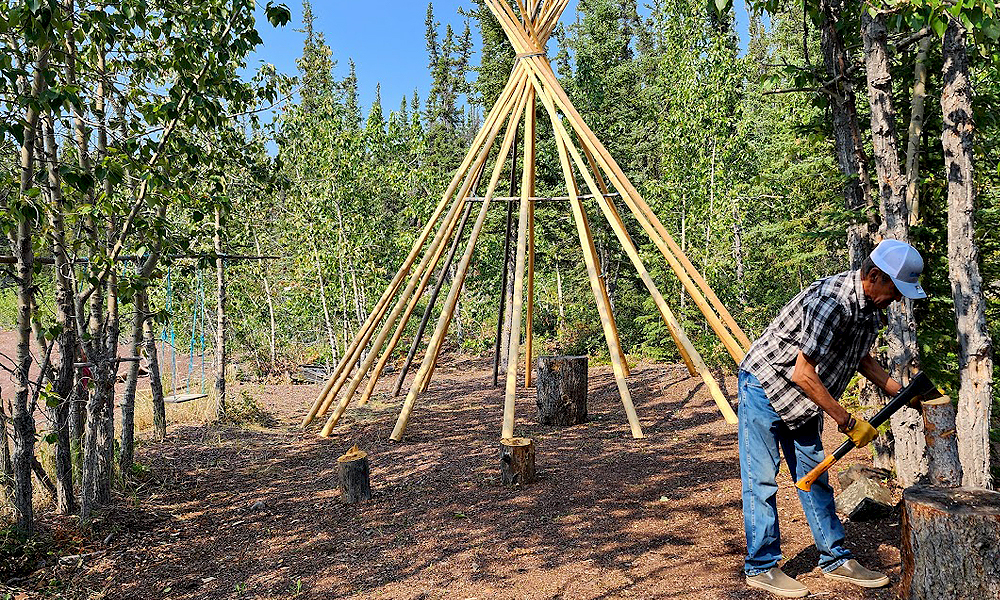On The Land
Overview
In community-based monitoring, community members receive the physical tools to use local and traditional knowledge in conservation. As opposed to methods where power is delegated by governmental bodies, communities often decide their own monitoring methods and priorities.
Example
- Community members use various tools and techniques such as camera traps, survey apps, audio recording units, water testing kits, etc., depending on the aspect of the land being monitored. For example, field protocols for standardized monitoring of caribou and reindeer can be established with harvesters, enabling comparisons within and across populations, over time, and spanning vast geographic regions. Through monitoring, harvesters and researchers can evaluate population health and detect changes, informing management decisions.
- Example research protocols: University of Calgary
- Rangifer Anatomy Website
Literature
- Popp, J. N., Priadka, P., & Kozmik, C. (2019). The rise of moose co-management and integration of Indigenous knowledge. Human Dimensions of Wildlife, 24(2), 159-167.
- Kutz, S., Ducrocq, J., Cuyler, C., Elkin, B., Gunn, A., Kolpashikov, L., … & White, R. G. (2013). Standardized monitoring of Rangifer health during International Polar Year. Rangifer, 91-114.
- Macdonald, J. M., Robinson, C. J., Perry, J., Lee, M., Barrowei, R., Coleman, B., … & Douglas, M. (2021). Indigenous-led responsible innovation: lessons from co-developed protocols to guide the use of drones to monitor a biocultural landscape in Kakadu National Park, Australia. Journal of Responsible Innovation, 8(2), 300-319.
Overview
Some forms of monitoring involve interventions on the land, such as ecocultural restoration of Indigenous lands or experimental re-creation of Indigenous resource management areas.
Example
Animals are monitored according to their health (including zoonotic disease and potential food safety risks), as well as population demographics and trends (contributing to Indigenous management of biodiversity as well as supporting healthy human-wildlife relationships), facilitating further development of a sustainable wildlife based economy.
Literature
- Jackley, J., Gardner, L., Djunaedi, A. F., & Salomon, A. K. (2016). Ancient clam gardens, traditional management portfolios, and the resilience of coupled human-ocean systems. Ecology and Society, 21(4).
- Senos, R., Lake, F. K., Turner, N., & Martinez, D. (2006). Traditional ecological knowledge and restoration practice. In: Apostol, Dean; Sinclair, Marcia, eds. Restoring the Pacific Northwest: the art and science of ecological restoration in Cascadia. Washington, DC: Island Press: 393-426. Chapter 17., 393-426. https://www.fs.usda.gov/treesearch/pubs/50696
- Turner, N. J. (2020). From “taking” to “tending”: learning about Indigenous land and resource management on the Pacific Northwest Coast of North America. ICES Journal of Marine Science, 77(7-8), 2472-2482.
Learn from our Team! Watch the recorded session titled ‘Walking Methodology,’ which took place on October 21, 2024. This talk introduces the participatory action research and pedagogy “walking methodology” based on the land relations among the Tayal in Taiwan. This method carves out space for the co-production of the Tayal ways of knowing and being, and revitalizing Tayal’s lifeworld around millets. In this era of multiple crises, we argue that the walking pedagogy responds at the fundamental level to the impacts of climate change.
Presenters:
Wasiq Silan: Ărramăt Co-Applicant, Tayal, College of Indigenous Studies, National Dong Hwa University
Yih-Ren Lin: Graduate Institute of Museum Studies, Taipei National University of the Arts
Cliquez ici pour écouter en français!
¡Haga clic aquí para escuchar en español!
Click here for a PDF of their Presentation (English)
Video shared:【LiMA新聞世界 第96集】全球高山部落的雲端相遇與結盟(中英字幕)
Learn from our Team! Watch the recorded session titled ‘Land-Based Learning,’ which took place on December 2, 2024. Learn tips for organizing and implementing meaningful and impactful programs on land and water with youth, community learners and Knowledge Holders.
Presenters:
Former Chief Wanda Pascal: Elder/Knowledge Holder, Teetł’it Zheh
Mike Low: Aboriginal Aquatic Resource and Oceans Management (AAROM) Program Coordinator, Dehcho First Nations
Kelsey Dokis-Jansen: PhD Candidate, University of Alberta, Dokis First Nation/Foothills Ojibway First Nation
Cliquez ici pour écouter en français!

